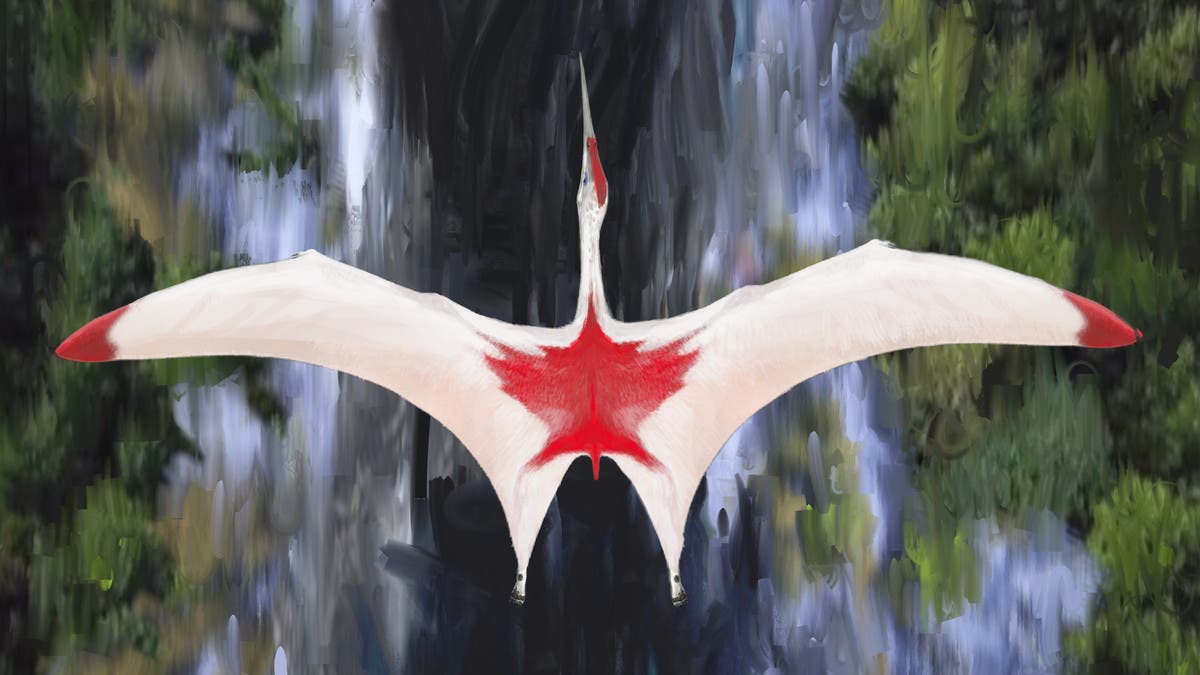A fossil jawbone peeking out from a limestone seashore on Scotland’s Isle of Skye led scientists to discover the skeleton of a pterosaur that showed that these remarkable flying reptiles got big tens of millions of years earlier than previously known.
For the latest headlines, follow our Google News channel online or via the app.
Researchers said on Tuesday this pterosaur, named Dearc sgiathanach, lived roughly 170 million years ago during the Jurassic Period, soaring over lagoons in a subtropical landscape and catching fish and squid with crisscrossing teeth perfect for snaring slippery prey.
Its scientific name, pronounced “jark ski-an-ach,” means “winged reptile” in Gaelic.
With a wingspan of about 8 feet (2.5 meters), Dearc was the Jurassic’s largest-known pterosaur and the biggest flying creature that had inhabited Earth to that point in time. Some pterosaurs during the subsequent Cretaceous Period achieved much greater dimensions – as big as fighter jets. But Dearc shows that this scaling up had its origins much earlier.
A forensic analysis of its bones indicated this Dearc individual was not fully grown and could have had a 10-foot (3-meter) wingspan as an adult.
Dearc weighed very little – probably below 22 pounds (10 kg) – thanks to its hollow, lightweight bones and slender structure, said University of Edinburgh paleontology doctoral student Natalia Jagielska, lead author of the research published in the journal Current Biology.
It had an elongated skull and a long, stiff tail. An arsenal of sharp teeth formed a cage when it bit down on prey.
Pterosaurs, which lived alongside the dinosaurs, were the first of three vertebrate groups to achieve powered flight, appearing about 230 million years ago. Birds appeared about 150 million years ago and bats around 50 million years ago.
Pterosaurs are some of the rarest vertebrates in the fossil record owing to their fragile bones, some with walls thinner than a sheet of paper.
“Our specimen, anomalously, is well preserved – retaining its original three dimensions and being almost complete, and still articulated as it would be when alive. Such state of preservation is exceptionally rare in pterosaurs,” Jagielska said.
Up until when Dearc lived, pterosaurs generally had been modest in size, many about the size of a seagull. The prevailing wisdom among scientists had been that pterosaurs did not reach Dearc’s size until the Cretaceous, some 25 million years later, with the appearance of creatures like Huanhepterus, Feilongus and Elanodactylus. Quetzalcoatlus, appearing about 68 million years ago, boasted a wingspan of about 36 feet (11 meters), like an F-16 fighter.
“In the Cretaceous, some pterosaurs got enormous. These were some of the most superlative animals that ever lived. Dearc was not close to them in size or grandeur, but it was 100 million years older. Evolution needed time to make such giants,” University of Edinburgh paleontologist and study co-author Steve Brusatte said.
“One idea is that pterosaurs only got larger after birds evolved, when the two groups were competing with each other for the aerial niches. But Dearc tells us that pterosaurs already got to be the size of today’s largest birds even before the first birds evolved, so it throws a wrench into this idea,” Brusatte added.
In Dearc’s time, Britain was closer to the equator and existed as a series of smaller separate islands. Dearc lived alongside a menagerie of plant-eating and meat-eating dinosaurs, early mammals and marine reptiles.
Dearc was discovered in 2017, with the fossil jutting out from a limestone intertidal zone after the tide had gone down.
“We were gobsmacked,” Brusatte said. “Nothing like this had ever been found in Scotland.”
They battled the tide, first using hammers and chisels and then diamond-tipped saws. But the tide interrupted before the skeleton could be fully extracted.
“The tide came in with a vengeance, and we cried as the waves lapped over the fossil,” Brusatte said. “We thought we lost it. But we decided to come back around midnight when the tide was down again, using our headlamps and flashlights. We were shocked and relieved to see the bones still there as the waves receded.”
Read more:
Archaeologists discover 40 beheaded Roman skeletons with skulls between their legs
Shark-toothed dinosaur existed in Uzbekistan 90 mln years ago: Scientists
Scientists discover hundreds of thousands of animal, human bones in Saudi Arabia cave

 World3 years ago
World3 years ago
 World3 years ago
World3 years ago
 Business11 months ago
Business11 months ago
 Entertainment7 years ago
Entertainment7 years ago
 World7 years ago
World7 years ago
 Entertainment7 years ago
Entertainment7 years ago






